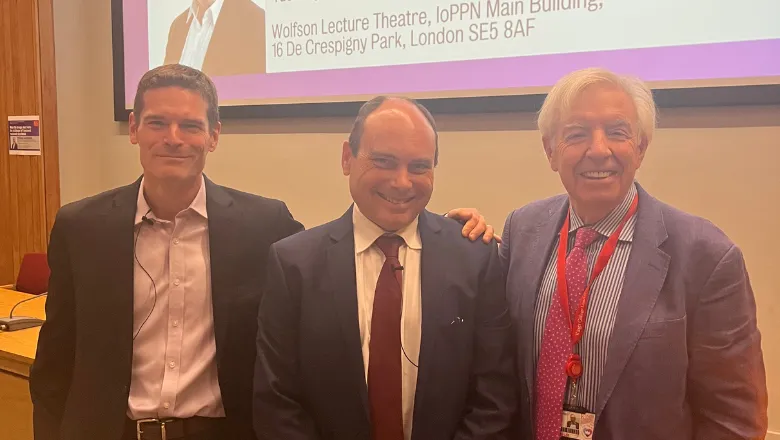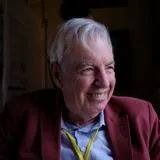Professor James MacCabe delivered the ninth inaugural lecture of the 2022/23 IoPPN Inaugural Lecture Series, entitled 'When the drugs don't work: the challenge of treatment resistant psychosis' on 4 July 2023.

James MacCabe is Professor of Epidemiology and Therapeutics based in the Department of Psychosis, Institute of Psychiatry, Psychology and Neuroscience (IoPPN), King's College London and Academic Director of the Psychosis Clinical Academic Group of King's Health Partners.
Professor Oliver Howes, Head of Department for the Department of Psychosis at the IoPPN, opened the lecture with a welcome speech, thanking attendees, special guests and family.
Professor MacCabe talked us through his family history and early childhood, citing his father and grandfather as excellent role models for drive and resilience. He firmed up his interest in medicine and psychiatry in high school. His mother's illness made him to want to understand and treat mental illness. He qualified in Medicine at Charing Cross and Westminster Medical School (now Imperial College) which included an intercalated BSc in Psychology from University College London. He specialised in Psychiatry at the South London and Maudsley NHS Trust. His interest in psychosis led him to work in the National Psychosis Unit and he later did a PhD with Professor Anthony David and Professor Sir Robin Murray. He has worked on understanding the mechanisms of treatment resistant schizophrenia and the role of clozapine in particular.
Thank you to Oliver, Robin and everyone who helped to organise the event for giving me an opportunity to acknowledge the many people who have inspired and helped me over the course of my life and career.
Professor James MacCabe, Professor of Epidemiology and Therapeutics, King's IoPPN
Professor MacCabe applies the techniques of epidemiology and population research to study the causes, consequences and treatments of psychoses, particularly in treatment resistant schizophrenia and personalized medicine. He is an active clinician and spend 50% of his time working in the NHS as Honorary Consultant Psychiatrist at the National Psychosis Unit, at the Bethlem Royal Hospital, South London and Maudsley NHS Foundation Trust. This is the only national tertiary referral centre for treatment-resistant psychosis in the UK.
In the closing vote of thanks, Professor Sir Robin Murray, Professor of Psychiatric Research, IoPPN, said "I am sure you are all convinced what a great academic James is, but he is also a very outstanding clinician and one of the mainstays of our National Psychosis Unit. James has excellent clinical judgement but is also very kind and caring to patients and this is a very notable characteristic...it really is the most powerful tool psychiatrists and psychologists have for getting our patients better. In my view, it is at least as important as having highly cited research papers and of course James has both, and he is also a great lecturer as we have heard this evening".
We've heard a wonderful lecture. It was funny, informative but also very touching, I don't think many inaugural lectures are as touching as that. Many of us come into psychiatry because we have personal difficulties ourselves or because our family have been touched by psychiatric illness but not many of us are so open about that as James and I think more of us ought to be.
Professor Sir Robin Murray, Professor of Psychiatric Research, King's IoPPN
To view previous lectures and to find out about upcoming lectures in the Inaugural Lectures series, please visit Inaugural Lectures.









